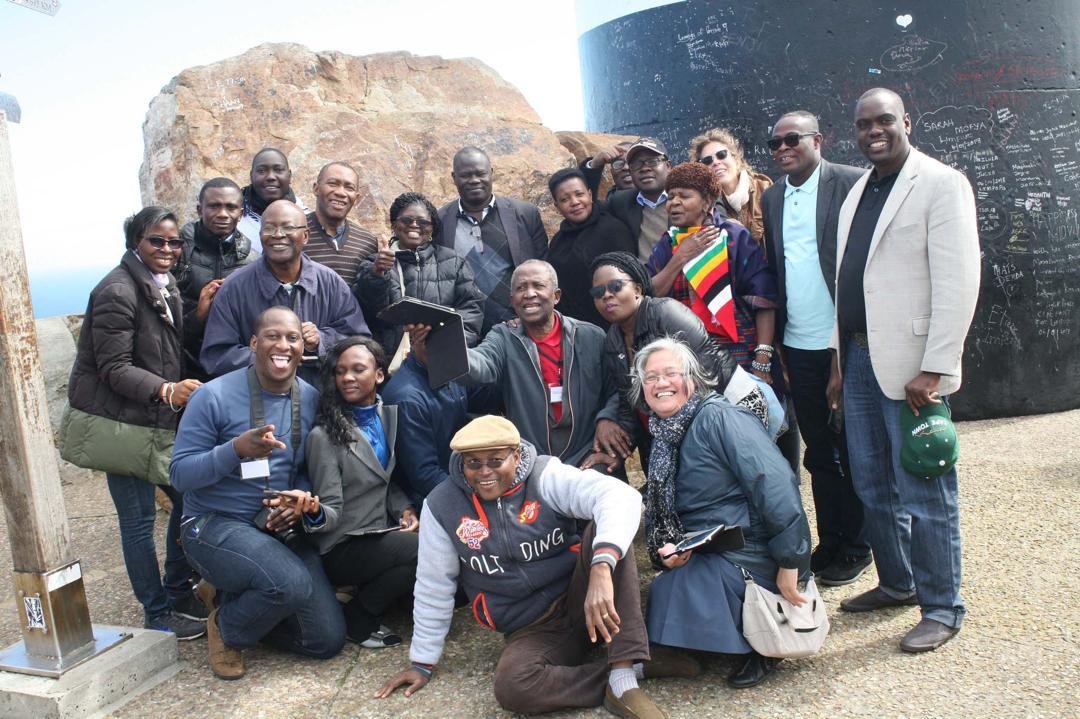News
Protect journalists against COVID-19
The protection of journalists against the coronavirus disease (COVID-19) is paramount as their work involves frequent interviews with people at all levels while performing their duties.
In this era of COVID-19 the work of journalists has become more challenging and risky; therefore, their safety should not be compromised at all as they can easily contract the virus at the least negligence and later spread it because they leave their homes to report in this difficult circumstances and at the end of the day go back to their families.
Recent photographs captured by the Spectator’s photojournalists showed media persons breaching the COVID-19 protocol on social distancing as they huddled round an interviewee to take photos and record him as duty demands to feed their media houses with the news for public consumption.
In fact, the rate at which the coronavirus is spreading at the community level is so alarming. The current confirmed cases is 22,822 with 17,564 recoveries/discharge and 129 deaths. It should serve as a warning sign for journalists to take their destiny into their own hands and be responsible for their own safety.
In an interview, some of the journalists who spoke to our photojournalist on condition of anonymity, for fear of reprisal from their employers, complained that, “We are going into the field, returning to the office, working and contacting the public in the same way, without Personal Protective Equipment (PPE) from our employers.”
Another journalist revealed, “I am mentally and conditionally prepared that I am going to get the virus, and I do not feel like I can save myself from this.” According to him, “job security is also another issue affecting the mental health of journalists, many of whom have lost their jobs during the pandemic.”
It is obvious that for fear of losing their jobs these journalists had to sacrifice in such dangerous circumstance to seek information for their media houses at the expense of their health. Reports say that some journalists have already tested positive with the virus and many more are extremely vulnerable because of their daily news coverage.
It behoves on authorities of media houses to provide PPE and the necessary equipment for their media team, especially the camera crew to help them zoom from afar as they must stay safe and healthy to report on issues. Also, journalists with serious health conditions which make them vulnerable must be allowed to work from home.
Meanwhile, journalists must strictly adhere to the COVID-19 safety protocols and wear nose or face masks regularly, wash their hands regularly with soap under running water, use alcohol-based sanitisers to clean their microphones, cameras, recorders and all other equipment and also ensure that they abide by all other protocols for their own safety as COVID-19 is no respecter of persons.
Per UNICEF’s safety guidelines for journalists reporting on COVID-19, “if a government spokesperson, senior official or minister is giving a statement, agree among yourselves to record them from at least six feet away and try to stand without huddling.”
The guidelines further says that, “Better still, convince dignitaries to conduct digital press conferences with questions from journalists taken up live as there are plenty of technological platforms available to make this happen”
The Ghana Journalists Association (GJA) must also ensure that all journalists adhere to the GJA’s guidelines for journalists on COVID-19 precautionary measures when reporting, to ensure that they are protected against the virus as they are daily exposed to all kinds of dangers.
Also, a photojournalist disclosed that despite their “wish to adhere to the precautionary measures, the reality on the field while covering events is different” so the GJA must act promptly to check these realities on the ground and address those issues.
“We always need to get close enough to get good visuals and photographs of both health workers and patients to tell our stories,” the photojournalist added.
The Spectator would like to appreciate the efforts of some individuals and organisations that have so far donated PPE to some media houses to support journalists. We further appeal to other benevolent organisations to donate more PPE to enhance the work of journalists.
Companies that are in the position of donating modern equipment to media houses should not hesitate to do so or sell them at reduced costs in this era of COVID-19 to help the media houses to perform their duties effectively.
The government must also give a special package to journalists who risk their lives to cover assignments on COVID-19 as a form of motivation.
News
Ghana-Colombia strengthens ties through diplomatic engagement

In an important diplomatic engagement, the Colombian Ambassador to Ghana H.E. Daniel Garces Carabali paid a courtesy call on the Minister for the Interior, Muntaka Mohammed-Mubarak, at his office in Accra to discuss some key areas of collaboration.
The meeting focused on pressing issues, including security, decongestion of Ghana’s prisons, prison reform programmes, training programmes, improving the welfare of prisoners and enhancing disaster management in the country.

The courtesy call underscores the growing bilateral ties between Ghana and Colombia, building on previous engagements, such as the visit of the Colombian Vice President to Ghana in 2023.
The meeting demonstrates the commitment of both nations to fostering cooperation and addressing shared challenges.
News
Ghana to host African Catholic Journalists from August 10

The Union Catholique Africaine de la Presse (UCAP), also known as the African Catholic Union of the Press, in collaboration with the Catholic Association of Media Practitioners-Ghana (CAMP-G), is set to host its prestigious Triennial Congress from August 10 to 17 August, 2025.
The programme would be held at the Ghana Institute of Management and Public Administration (GIMPA), Legon, Accra, Ghana.

This landmark event, the most significant gathering of Catholic journalists in Africa, will bring together media professionals, researchers, and experts in digital technology from across the continent and beyond.
The theme for the Congress is: “Balancing Technological Progress and the Preservation of Human Values in the Age of Artificial Intelligence.”
Congress Highlights
The UCAP Congress 2025 will feature discussions and deliberations on critical issues arising from or related to integral human development, particularly within the framework of Artificial Intelligence (AI).
Some of the key sub-themes to be addressed include:Corporate Social Responsibility in Managing the Impact of Artificial Intelligence on Human Values, Deploying AI in Eco-friendly Business Start-ups in Africa: Opportunities and Challenges, Technology and the Reprogramming of Social Reality, Distortion of Reality in Social and Digital Media, Ecological Education and Action Against Unsustainable Exploitation of Natural Resources, and Media and the Promotion of the Recommendations of the Synod on Synodality in Africa.
Participants will include media professionals from both ecclesiastical and lay organisations, media researchers and academics, representatives from the Vatican, government agencies, NGOs, civil society, and the digital technology sector.
Objectives of the Congress
The primary goal of this Congress is to strengthen the capacities of media professionals and educate the public on the necessity of preserving human values amid rapid technological progress. Specific objectives include; Training 100 media practitioners in Artificial Intelligence and emerging technologies, with a focus on balancing innovation and human values.
This will include promoting ethics and bioethics in technical research and technological innovations through media.
Advocating for human values such as respect for life, human dignity, charity, solidarity, and human rights and assessing the impact of technological progress to better understand the challenges, risks, and opportunities presented by AI will be part of the objectives.
UCAP is a continental organisation dedicated to promoting communication within the Catholic Church and its partners in Africa. With a mission to foster spiritual growth, collaboration, and responsible journalism, UCAP works to spread the Gospel, uphold human values, and support developmental initiatives across Africa and beyond.
UCAP is an independent, autonomous, non-political, and non-profit organisation comprising African Catholic journalists, communicators, academics, researchers, and institutions in various media fields.







